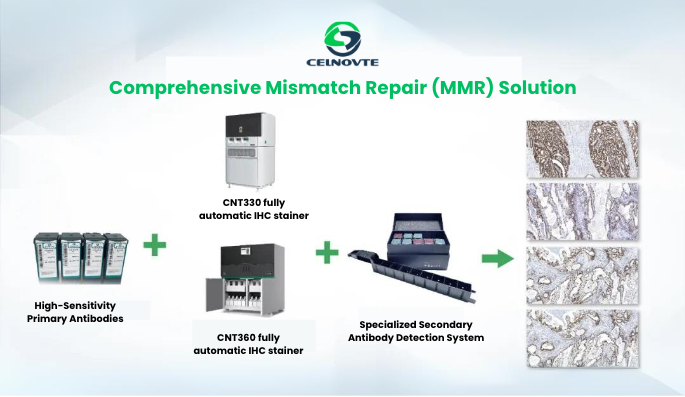Introduction
Mismatch Repair (MMR) is crucial for maintaining genomic stability by correcting base mismatch errors during DNA replication. This system, comprising several proteins like MLH1, MSH2, MSH6, and PMS2, is essential for preserving the integrity of the genome. Accurate detection of MMR proteins is vital for diagnosing and treating various cancers. Celnovte Biotechnology has developed a new comprehensive MMR detection solution that optimizes multiple aspects to enhance staining effects and promote the standardization of MMR protein detection.
Understanding the Mismatch Repair System (MMR)
The MMR system plays a pivotal role in correcting DNA replication errors, which helps prevent mutations from being passed on during cell division. It involves several key proteins that identify and repair mismatched nucleotides. When this system fails, it can lead to an accumulation of mutations, contributing to cancer development.
Primary Proteins in MMR
The MMR system relies on four primary proteins: MLH1, MSH2, MSH6, and PMS2. These proteins work in concert to identify and repair DNA mismatches, ensuring genomic stability. Their proper functioning is critical for preventing mutations that could lead to cancer.
Clinical Significance of MMR Protein Detection
MMR protein detection has significant clinical implications, particularly in the context of cancer diagnosis and treatment.
Lynch Syndrome Screening
Lynch syndrome is a hereditary condition caused by germline mutations in MMR genes, predisposing individuals to colorectal cancer, endometrial cancer, and other malignancies. Detecting MMR protein deficiencies is crucial for identifying Lynch syndrome patients, who typically exhibit the dMMR/MSI-H phenotype.
Tumor Prognosis Determination
In stage II colorectal cancer, patients with dMMR/MSI-H have a lower recurrence risk and better survival rates. The TCGA classification of endometrial cancer highlights the prognostic value of MMR status, with the MSI-H type having a better prognosis compared to other types.
Predicting Chemotherapy Efficacy
Stage II colorectal cancer patients with dMMR/MSI-H do not benefit from adjuvant chemotherapy with fluorouracil monotherapy. Hence, MMR protein detection can guide treatment decisions, avoiding ineffective chemotherapy in these patients.
Predicting Immunotherapy Efficacy
Patients with dMMR/MSI-H respond well to immune checkpoint inhibitors. Current guidelines recommend using dMMR/MSI-H status as a predictor of immunotherapy efficacy across various solid tumors.
Challenges in MMR Immunohistochemistry (IHC) Staining
Despite its importance, MMR IHC staining presents several challenges. Factors such as cytoplasmic staining, weak or absent staining in internal control cells, and tumor cell heterogeneity can affect results.
Factors Affecting IHC Staining Results
IHC staining accuracy can be compromised by several factors, including:
- Cytoplasmic staining
- Weak or absent staining in internal control cells
- Tumor cell heterogeneity
- Specific pathological features
- Neoadjuvant chemoradiotherapy
- Sample quality
- Rare staining patterns
Importance of Standardization in MMR Detection
To improve the accuracy of MMR detection, standardization of staining procedures is crucial. This involves consistent application of validated protocols to ensure reliable results across different laboratories and settings.
Introducing Celnovte Biotechnology's MMR Detection Solution
Celnovte Biotechnology has introduced a comprehensive MMR detection solution that addresses existing challenges by optimizing staining procedures and promoting standardization.

High-Sensitivity Primary Antibody
The kit includes high-quality monoclonal antibodies for MLH1, MSH2, MSH6, and PMS2, validated together to ensure higher staining consistency. These antibodies are designed to provide clear, reliable results.
Specialized Secondary Antibody Detection System
The upgraded secondary antibody detection system enhances staining effects, specifically adapted for MMR detection. This system ensures robust signal amplification, leading to more precise and reliable results.
Standardized Validation Procedures
Special staining procedures tailored to antibody characteristics ensure the accuracy and consistency of staining results. These procedures have been rigorously validated to provide reliable diagnostic information.
Benefits of Celnovte's MMR Detection Solution
By improving antibody reagents, secondary antibody detection systems, and staining procedures, Celnovte Biotechnology’s solution enhances staining quality comprehensively. This addresses existing issues and provides more standardized and accurate staining solutions for pathological diagnosis.
Staining Examples
Below are examples of staining with the new MMR detection solution, demonstrating its effectiveness and consistency.
MLH1 Staining Example
MLH1 staining shows a strong nuclear signal in cells with intact MMR function, providing clear differentiation between normal and deficient cells.
MSH2 Staining Example
MSH2 staining patterns reveal the presence or absence of this protein, crucial for diagnosing MMR deficiencies in various cancers.
MSH6 Staining Example

PMS2 Staining Example
PMS2 staining provides insights into the MMR status of cells, essential for accurate pathological diagnosis and treatment planning.
Conclusion
Celnovte Biotechnology's new comprehensive MMR detection solution offers significant advancements in the accuracy and standardization of MMR protein detection. By integrating high-sensitivity primary antibodies, a specialized secondary antibody detection system, and standardized validation procedures, this solution addresses current challenges and improves the reliability of pathological diagnoses.
FAQs
What is the Mismatch Repair System (MMR)?
The Mismatch Repair System (MMR) is a cellular mechanism that corrects base mismatch errors during DNA replication, maintaining genomic stability.
Why is MMR protein detection important?
MMR protein detection is crucial for diagnosing conditions like Lynch syndrome, predicting chemotherapy and immunotherapy efficacy, and determining tumor prognosis.
How does Sinotech Bio's new MMR detection solution improve staining accuracy?
Sinotech Bio's solution includes high-sensitivity primary antibodies, a specialized secondary antibody detection system, and standardized validation procedures to enhance staining accuracy and consistency.
What challenges are associated with MMR IHC staining?
Challenges include cytoplasmic staining, weak or absent staining in internal control cells, tumor cell heterogeneity, specific pathological features, and sample quality.
How does MMR status affect chemotherapy efficacy?
Patients with dMMR/MSI-H, particularly in stage II colorectal cancer, do not benefit from adjuvant chemotherapy with fluorouracil monotherapy, highlighting the importance of MMR status in treatment planning.
Can MMR status predict immunotherapy efficacy?
Yes, patients with dMMR/MSI-H respond well to immune checkpoint inhibitors, and current guidelines recommend using MMR status as a predictor of immunotherapy efficacy for various solid tumors.







